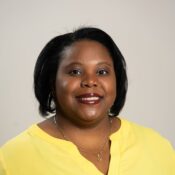
Speaker
Christy Clark-Pujara
Professor of African American Studies
Christy Clark-Pujara, Ph.D., is a historian whose research focuses on the experiences of Black people in French and British North America in the 17th, 18th and early 19th centuries. She is particularly interested in retrieving the hidden and unexplored histories of African Americans in areas that historians have not sufficiently examined — small towns and cities in the North and Midwest. She contends that the full dimensions of the African American and American experience cannot be appreciated without reference to how Black people managed their lives in places where they were few. An absence of a large Black populace did not mean that ideas of blackness were not central to these places’ social, political, and economic development. Her first book, “Dark Work: The Business of Slavery in Rhode Island,” examines how the business of slavery — economic activity that was directly related to the maintenance of slaveholding in the Americas, specifically the buying and selling of people, food, and goods — shaped the experience of slavery, the process of emancipation, and the realities of black freedom in Rhode Island from the colonial period through the American Civil War.
Speaking in
Bridging the Divide: The Arts as a Catalyst for Inclusive Community
An annual Arts-centered panel presented in collaboration between the Division of the Arts and DDEEA that delves into the intersection of the Arts with the annual theme of the Diversity Forum, and with UW Madison’s faculty, staff, students and community members.
This year, our panel of advocates, artists, creatives, designers, and cultural practitioners explores the arts’ profound impact on fostering belonging, essential for flourishing and inclusive communities. We delve into:
1) how the arts embrace differences, celebrate similarities, and cultivate belonging.
2) the intersection of art, diversity, and community practice, highlighting scholar-artists and practitioners.
3) the arts’ powerful role in fostering unity and understanding.
Discover how the arts empower UW Madison’s faculty, staff, students, and community members, elevating cultural activities beyond aesthetics and promoting harmony through diversity. Explore how ‘Artful Connections’ negotiates access versus a sense of belonging.